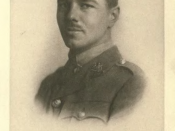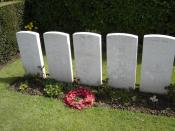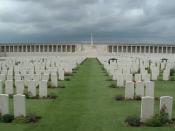Wilfred Owens 'Dulce et Decorum Est' is a powerful antiwar poem, in which events take place during the World War 1. The theme of the poem is anti-war, and through the use of dramatic descriptions and vivid figurative language, Owen seeks to convince us that the war is appalling and horrifying.
Owen uses figurative language to reveal the reality of war. In the first two opening lines he uses two similes, "Bent double, like old beggars under sacks" which describes the physical posture of the soldiers and "coughing like old hags" expresses the effects of the gas, which is hardly the description we would expect of something which is 'right and fitting'. Owen also uses alliteration like "Bent double like old beggars" and "Knock kneed" to accentuate the beauty of the language. Own through the use of these similes, explains how exhausted and worn-out these soldiers are that they can be compared with "beggars" and "hags".
This is not how we would portray young enthusiastic soldiers marching off to save their country; on the contrary they are no longer fit, healthy and keen and nor are they soldiers anymore but tired and exhausted young men. In the forth line it tells us that these soldiers are returning from the front to their "distance rest" where some will never make. Owen tries through the power of language to show us the sheer exhaustion of these men. "Lame", "blind", "drunk" and "deaf" show us the level of debilitation and how young men after the continuous gas shells exploding. In the last line of the first stanza "of tired, outstripped Five-Nines that dropped behind" through personification shows even the bombs were "tired" and "outstripped", which again emphasis on the conditions of these men.
In the second stanza, you can immediately sense...


